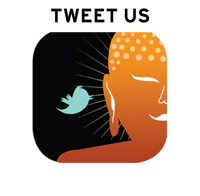 The Roots of a Crisis
The Roots of a Crisis
“The Witness” (Spring 2015), by Paul Kingsnorth, was sheer brilliance. Not because it provided good answers but because it asked deep and important questions: What is the nature of nature? Who decided that the planet should remain in a state that only humans find conducive? Is this not a form of clinging to something that is not fixed?
Once we remove illusions and see things as they are, we come to understand that the nature of reality is change. All “things” are actually just processes with no real ground to stand on. Nature is not only in flux, it is flux. Everything—from wind to cabbage to humans to dinosaurs to entire continents—is impermanent, interrelated, and empty.
So what are we to do about the so-called ecological crisis? I don’t have an answer to that. But as Kingsnorth points out, it’s important to understand that the roots of the ecological crisis are not technological, nor even economic (although they do manifest themselves in this way); rather, they “are rooted in the stories we tell ourselves as a civilization about who we are and where we are going.” That, I think, is the most important lesson of all.
—Mark Bessoudo
Toronto, ON
Unconditional Compassion
As a former student of Geshe Michael Roach’s, one who had a very positive experience at his public teachings, I find myself moved to reply to the author of “Obsession and Madness on the Path to Enlightenment” (Summer 2015) and the Tricycle community.
I found the article intriguing in a sort of gory way, like passing by a car wreck and having to look. But it left me feeling as if I’d been in a school playground overhearing humiliating gossip about someone the gossipers hadn’t ever really tried to know. So much of the article takes aim at Michael’s shortcomings, often giving the impression of being on a witch hunt. In a Buddhist journal I expect more than accusations and pointed suggestions of spell casting; I expect articles to be written, at least partially, from a Buddhist perspective, meaning that they would look upon their subjects with both with clarity and compassion—even upon a “fallen” teacher.
—Joshua Horwitz
New York, NY
 Woman, Unheard
Woman, Unheard
I thoroughly enjoyed “A Voice from the Outside” (Summer 2015), which hinted compellingly at both the physical and spiritual dimensions of a reclusive life. But I kept wondering how the interview, especially considering its length, could fail to place the presence of Mr. Budbill’s wife in any context at least as apparently meaningful and germane as that of the seasons, the gardening, the books, or the mountains. Except for this omission, it was an inspiring read.
—Jeff Basile
Indianapolis, IN
Me, You, and Everyone Else
Curtis White’s review “It’s Not Me, It’s You” (Summer 2015), is misnamed if he meant to represent a Buddhist viewpoint. More correctly, his article should have been entitled “It’s Me, and It’s You.” Chekawa Yeshe Dorje, in his famous Seven Points for Training the Mind, made it clear: “Gather all blame into one.” It’s our view that creates our misery, not our employer. Not all employees are unhappy at their jobs. Some may experience great delight. Of course employers are not guiltless, but it seems old hat to blame them for the misery my own mind creates. If employees are introduced to meditation to make their company more profitable, why not? Just don’t call it Buddhist.
—Ace Remas
Larkspur, CA
It is the editors of Tricycle, not the writers (in this case Curtis White), who pen the titles of articles. —The Eds.

Buddhism is not a philosophy, science, psychotherapy, or culture. It is a religion. http://tricy.cl/1I4OIzN
-Tricycle Magazine (@tricyclemag)
@tricyclemag It’s not a philosophy, science, psychotherapy, culture OR a religion. Why try to force it into one of those categories?
-Brad Warner (@BradWarner)
@BradWarner @tricyclemag It is a philosophy, science, psychology, culture, AND a religion. (Don’t know about therapy.)
-Donald Dow (@el_donaldo)
It is what it is.
-The Interdependence Project (@IDproject)
Send letters to editorial@tricycle.com, post a comment on tricycle.com, or tweet us at @tricyclemag.
Illustrations by Roberto La Forgia
Thank you for subscribing to Tricycle! As a nonprofit, we depend on readers like you to keep Buddhist teachings and practices widely available.